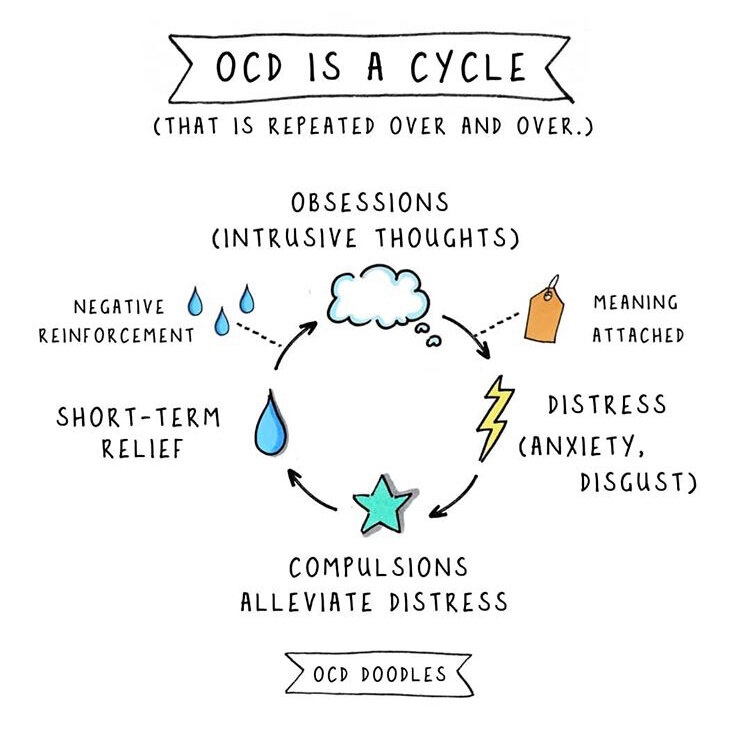OCD and Intrusive Thoughts

Our brain generates thousands of thoughts per day that come and go like a stream. Most thoughts that we have are related to our environment and things that are happening around us – an upcoming deadline, or a conversation we’re engaged in.
However, there are instances where a thought or image that may come to mind suddenly and out of nowhere that is disturbing or unwanted. We all at some time in our lives have had an intrusive thought – a thought or image that comes out of nowhere that may catch us off guard.
Perhaps you’ll be driving down the road and think, “What if I were to swerve and hit this pole up ahead?”
Maybe you’re using a knife to prepare your dinner and think “What if I were to slip and hurt myself?”
These thoughts for the average person may be confusing at first and unsettling but pass just the same as any other thought. However, these thoughts may generate doubt and discomfort for an individual with obsessive compulsive disorder to the point where they cannot simply dismiss it.
One may ask – what separates an intrusive thought and an OCD obsession?
The main components that separate the two is the doubt that is attached to an OCD obsession and what follows the thought.
Take the examples above:
An individual with OCD will be driving and have an obsession “What if I were to swerve and hit this pole up ahead?” Rather than continuing to drive past the pole as one may, they will begin to obsess over the doubt that they could drive into the pole. This doubt may cause them to pull to the side of the road out of anxiety, or make a sudden turn in order to avoid the street where the pole is. The more they drive around, their OCD may create a narrative about them hitting pedestrians and that it is unsafe for them to be driving in the first place.
They may put the knife down out of fear of acting on the thought and avoid anything sharp in their home, even asking a loved one to take it away from them or to prepare the meal instead. Their OCD may create a narrative that if they use a knife again, they are actively putting themselves in harm and are a bad person.
While the average person can stay present and move forward despite the intrusive thoughts, an individual with OCD will begin to doubt themselves and the environment around them. They may believe they are their thoughts and worry that if they do not avoid or engage in compulsions, that they are okay with the thoughts.
 (Photo Credit: OCD Doodles)
(Photo Credit: OCD Doodles)
So how does one with OCD manage these obsessional doubts in their day to day lives?
Exposure and Response Prevention (ERP) is an established treatment for individuals with OCD that aims to “expose” them to their feared doubts while engaging in response prevention of any behavioral response (compulsion) that their anxiety may be urging them to act on.
Exposures for the above examples may include:
Driving past the pole on purpose
Purposefully volunteering to cook or use a knife
Writing and/or reading a worst case scenario of their feared doubt
Response prevention for the above examples may include:
Not stopping on the side of the road or avoiding streets where there may be poles
Not avoiding cooking or asking a loved one to cook meals instead
ERP aims through gradual exposure to assist the individual to confront their doubts in a way that allows them to tolerate distress and make room for active coping rather than compulsions.
An individual’s obsessions will not completely go away through ERP but rather, their ability to manage doubt will grow and their obsessions may feel less intense over time.
Inference-Based CBT (I-CBT) approach to OCD can also assist an individual to separate their obsessional doubt vs. reality. A strategy that I-CBT may implement is utilizing grounding through one’s senses to help them redirect to focus on the reality before them rather than staying stuck obsessing over the doubt.
If you struggle with obsessive thoughts or would like to know more about treatment for OCD, please contact us to see how we can help.

Melissa Aristoza is an Associate Clinical Social Worker experienced in providing CBT for individuals dealing with: OCD, Generalized Anxiety, Specific Phobias, Panic, Social Anxiety and Depression. She supports children, teens, families, and adults in navigating through their mental health journey and assisting them in achieving their personal goals.
